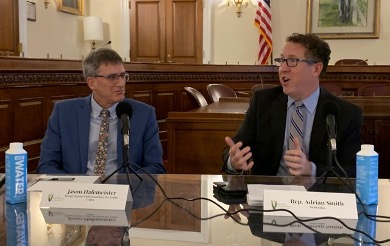FDA Commissioner Robert Califf is proposing a major reorganization of his agency centered around creation of a new Human Foods Program. The plan unifies key focus areas, removes redundancies and consolidates activities under the leadership of a new deputy commissioner of foods.
He says a national search is underway for the deputy commissioner, who will have “clear decision-making authority and oversight of priorities to ensure a safe and efficient food supply.”
The reaction: Industry and consumer groups welcomed the announcement as a good first step to act on needed changes called for in a recent report detailing the organizational and cultural challenges that limit FDA’s ability to effectively protect the U.S. food supply. However, the groups are looking for further details on how the deputy commissioner will function and the new organizational flow of different divisions at FDA.
There’s also concern in some quarters about what was left out of the plan, including the Center for Veterinary Medicine.
By the way: FDA Principal Deputy Commissioner Janet Woodcock will spearhead the implementation and change management group overseeing how the final changes will be made.
Read our full report on the FDA plan at Agri-Pulse.com.
USDA memo: Staffing issue partly behind drop in foreign reporting penalties
An internal Agriculture Department memo says staffing shortages were part of the reason the agency did not assess any penalties for failure to disclose foreign purchases of U.S. farmland between 2015 and 2018.
The memo, drafted by Farm Production and Conservation Division Deputy Undersecretary Gloria Montaño Greene, also said the program was under the leadership of a new manager at that time. The document, obtained by Agri-Pulse through a Freedom of Information Act request, said that more staff had been hired and “penalties have resumed.”
Greene relayed the information to Ag Secretary Tom Vilsack’s office sometime in October or November after being asked for background on the Agricultural Foreign Investment Disclosure Act and the agency’s policy around foreign acquisition of farmland. The memo mentions a letter sent by more than 100 House Republicans to the Government Accountability Office in October asking for a study on the topic.
Take note: The document also says the penalties assessed “have been low since the beginning of the program” at the direction of the secretary’s office in the early 1980s. While fees for filing late can reach up to 25% of the fair market value of the land, most are around 1% of the land’s value, the memo said.
Grassley sees growing concern about Chinese investment
Iowa GOP Sen. Charles Grassley, who helped pass the existing foreign farmland reporting requirements in the 1970s, says lawmakers are hearing increased concerns about Chinese acquisitions of farmland.
“Iowans raised this issue with me at my town meetings, foreign ownership competing with family farmers,” he said.
By the way: Grassley will be reintroducing legislation that would add USDA to the Committee on Foreign Investment in the United States, or CFIUS. A second bill he's pushing would bar Farm Credit entities from lending money for foreign purchases of U.S. farmland.
For a look at the new House Select Committee on China and how it could put some focus on ag land acquisitions, read our weekly Agri-Pulse newsletter. We also look at the Dietary Guidelines Advisory Committee’s focus on health equity.
Mexico’s GM corn objections could have wider implications
The first and most obvious reason the Biden administration is prioritizing Mexico’s threat to ban genetically modified corn is the impact it would have on U.S. trade. But the ban also could create a very negative precedent for international acceptance of biotechnology, says Rep. Adrian Smith, R-Neb. USDA’s Jason Hafemeister and Rep. Adrian Smith, R-Neb., discuss Mexico’s proposed biotech corn ban.
USDA’s Jason Hafemeister and Rep. Adrian Smith, R-Neb., discuss Mexico’s proposed biotech corn ban.
Smith, who chairs the Ways and Means Trade Subcommittee, spoke at a Capitol Hill reception Tuesday evening hosted by the National Corn Growers Association. He stressed that he hoped the U.S. would not have to challenge Mexico in a dispute settlement process under USMCA, but USDA and USTR officials have said that remains an option.
Jason Hafemeister, acting deputy undersecretary for trade at USDA, stressed the administration is loath to see other countries trying to take advantage of the U.S. by not living up to trade commitments.
NCGA President Tom Haag said simply: “We don’t want another country telling us what to plant.”
Interested in more coverage and insights? Receive a free month of Agri-Pulse by clicking on our link!
Check the Agri-Pulse newsletter for a look at Mexican politics behind the issue.
Dairy groups laud new US dispute with Canada
Groups representing the U.S. dairy industry are out in strong support of the Biden administration’s decision to call for a second dispute resolution panel under the U.S.-Mexico-Canada Agreement over claims that Canada is unfairly manipulating its dairy import quotas.
International Dairy Foods Association President and CEO Michael Dykes said the group is “very grateful to (U.S. Trade Representative Katherine) Tai … for moving forward with this enforcement action against Canada, the resolution of which is a critically important matter for U.S. dairy producers and processors.”
Despite losing a previous dispute ruling, Canada is preventing retailers and food service operations there from accessing tariff rate quotas and buying U.S. dairy goods, according to the Office of the USTR.
“Canada’s TRQ allocation system is not only a violation of USMCA — it directly harms American dairy farmers, processors, and other workers by unfairly restricting access to their market,” said Jim Mulhern, president and CEO of the National Milk Producers Association.
She said it. “We are checking our calendar every day to make sure that it’s not 2015 anymore.” - Public Lands Council Executive Director Kaitlynn Glover on recent Biden administration actions like Waters of the U.S. and grazing regulations.
Questions, comments, tips? Email philip@agri-pulse.com.







